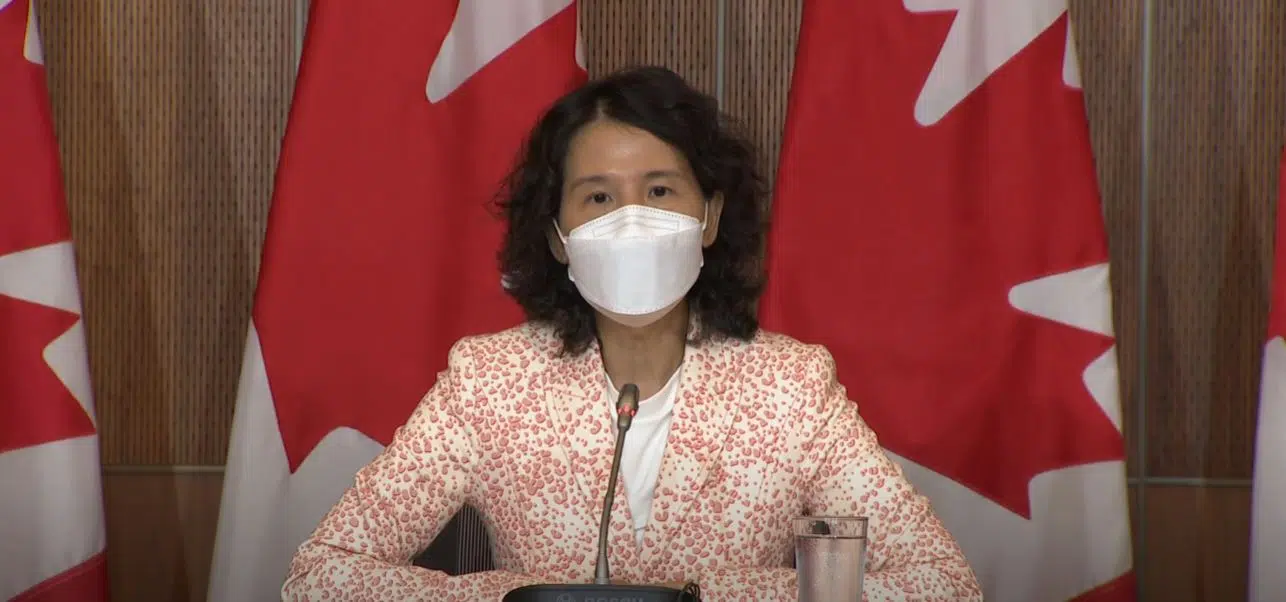
Canada’s chief public health officer, Dr. Theresa Tam provided an update on Health Canada's latest vaccine recommendations on Tuesday. Photo: CPAC.
Health Canada has given its approval to Moderna’s updated COVID-19 vaccine, making it available to Nova Scotians aged six months and older. This announcement comes after a two-month review period following Moderna’s submission of the revised vaccine. The new formulation is an mRNA-based shot designed specifically to target the Omicron XBB.1.5 subvariant, aligning it more closely with the virus strains currently in circulation.
Dr. Supriya Sharma, Health Canada’s chief medical advisor, emphasized the importance of vaccination as a means to protect against severe outcomes. Regardless of their prior COVID vaccination history, Canadians aged five and up are recommended to receive one dose. For children between six months and four years old who haven’t received a prior COVID vaccine, two doses are recommended, while those with at least one prior dose should receive a single booster.
It’s noteworthy that federal authorities are refraining from labeling these shots as boosters. Instead, they liken them to annual flu shots, emphasizing that the COVID situation is not yet stable. The goal is to establish a more routine schedule for updated vaccines, similar to the way flu shots are administered.
In determining the best time to receive another COVID shot, Health Canada advises waiting for six months after the last dose. While protection against infection may diminish over time, experts assure that protection against severe illness remains effective for a longer duration.
Canada’s national vaccine advisory body has reaffirmed the importance of vaccination, especially for individuals at a heightened risk of severe disease. This group includes seniors aged 65 and older, residents of congregate living settings like long-term care facilities, pregnant individuals, and those with underlying medical conditions. Additionally, essential workers and members of racialized, First Nations, Métis, and Inuit communities are encouraged to get vaccinated.
Health Canada is currently reviewing submissions from other drugmakers, such as Pfizer-BioNTech’s Omicron XBB.1.5 vaccine for Canadians aged six months and older, and Novavax’s shot for those aged 12 and up. Canada’s Chief Public Health Officer, Dr. Theresa Tam, assures that the country will have sufficient supply to support nationwide immunization programs.
Dr. Lynora Saxinger, an infectious diseases specialist at the University of Alberta, stressed the importance of these updated vaccines, even in the face of “booster fatigue.” These new vaccines effectively cover most critical mutations seen in recent variants. Preliminary clinical data suggests that the XBB.1.5 vaccine provides a promising immune response against various Omicron sublineages, with no indications of increased disease severity.
As COVID cases rise heading into the fall, with over 2,000 hospitalizations nationwide in early September, healthcare professionals are hopeful that a fall booster campaign can help curb virus transmission during the upcoming respiratory virus season. Combining a flu shot with a COVID vaccine is considered safe and practical.
Dr. Tam emphasizes the need for preparedness in the face of potential simultaneous surges of various respiratory viruses, including influenza and RSV, in the coming fall and winter.




